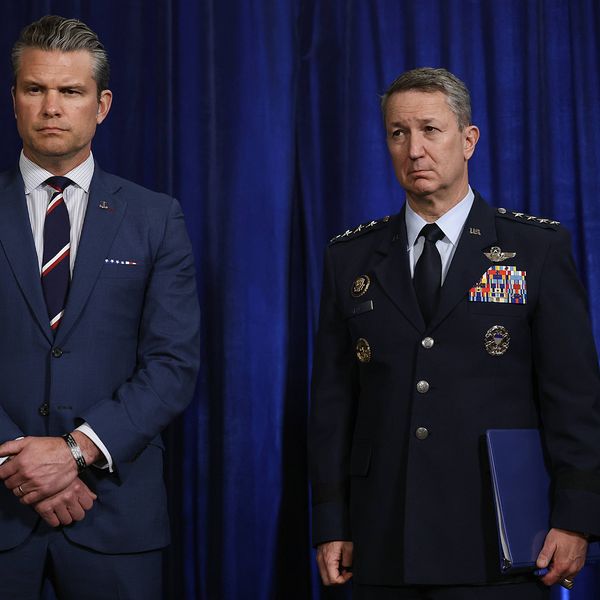The urge to intervene around the world may truly have become hardwired into the American psyche. How else to explain the seriousness with which some in Washington are suggesting that the United States take sides in the unfolding civil war in Libya?
The US is fighting two wars in Muslim countries. Since the results have included thousands of dead Americans, a near-bankrupt treasury and a surge in anti-Americanism in the world's most volatile region, launching a third war might seem unwise. Intervening in Libya would require the US to take sides in a highly obscure conflict. Any group the US helps bring to power would be heavily tainted, and Americans would have to defend it in an explosive environment.
And few people in the Middle East, or anywhere else, would believe that the US had intervened in an oil-rich Arab state without being interested in securing its oil.
Intervention in Libya has all the makings of another Middle East quagmire. The urge to intervene there, however, is not driven solely by factors related to Libya. Sure, there is genuine outrage at the brutality Muammar Gaddafi is inflicting on his people. No doubt, some American strategists have their eyes on Libyan oil, and others are looking for a new platform for US power in the Middle East. But beneath it all is the deep belief that when there is trouble in Libya - or Liberia or Lesotho or Laos or Lithuania - the United States needs to take a decisive stand and push to impose the solution it finds best.
The reasoning is simple, and deeply rooted in American history. The world is a dangerous place, it needs to be managed, and the United States is called to do the managing.
This is the view that led Theodore Roosevelt to assert that submitting to America's will was "the prerequisite condition to the moral and material advance of the people who dwell in the darker corners of the earth". It convinced Woodrow Wilson that the US needed to dominate Latin Americans so it could "teach them to elect good men". It propelled Dwight Eisenhower to overthrow democratic governments in Iran and Guatemala, ultimately plunging both countries into brutal dictatorship. More recently, it pulled Jimmy Carter into Afghanistan and George W Bush into Iraq, with devastating consequences for American power and security.
The effect of these operations on America's fiscal health has been equally cataclysmic. Costs of the Iraq and Afghanistan wars have reached one trillion dollars. That is two thirds of America's current budget deficit.
Despite all of this, there are still interventionists who insist that this time, the US can get it right. "It's hard to imagine any new government growing out of this opposition that is worse than Gaddafi," Senator Joseph Lieberman has blithely asserted. Millions of Iranians thought the same thing when they overthrew the Shah in 1979. They have learned a painful historical lesson: no matter how bad a regime is, there can always be a worse one. Gaddafi controlled every inch of Libyan territory, deftly balanced tribal and sectarian interests, and administered a reasonably effective state. Whether a new regime would be able to do any of those things is far from certain. Would the US stepping in to "help", do so?
Senator John Kerry has suggested that American warplanes "crater the airports" in Tripoli and other government-held cities - a nice way of saying that the US should bomb Libya: an act of war. Senator John McCain observed that decreeing a no-fly zone over Libya would be a good way to "send a signal to Gaddafi". Perhaps it would be as effective as the signal the US sent Saddam Hussein, who survived in office for 12 years after the Americans imposed two no-fly zones over his country.
The no-fly zone is a seductive option, but only to those who do not reflect on its complexity. It would require a major commitment of air power, and since at least some missile launchers will be located in populated areas, American bombs would almost certainly kill Libyan civilians. And given the balance of power in Libya, where ragtag rebels are outgunned by the regime's better organised troops and mercenaries, even sustained bombardment might not dislodge the tyrant. What would the US do then? Escalate until he is forced to flee, using ground troops if necessary?
Perhaps the appeal of the no-fly option is that it would give testosterone-driven politicians in Washington a way to pretend they are doing something meaningful to defend heroic rebels far away. Yet, the only real way to defeat Gaddafi quickly is by a land invasion, and even today's interventionists are unwilling - yet - to call for such madness. Invasion would resolve a short-term problem, but Libyans would presumably rebel against American occupation, just as Iraqis and Afghans have. The presence of American troops in Libya would be a magnet for every jihadist fighter in the world. An invasion might prevent or head off a civil war, but probably trap American forces into fighting another long-term insurgency.
Foreign interventions always end badly. They can sometimes be justified on the grounds that not intervening would produce even worse results, but such cases are rare. Libya is not one of them. No vital American interest is at stake there. In fact, as past interventions have shown, the outcome is likely to undermine the global stability on which the US depends.
When Hamlet tries to persuade his mother not to return to his uncle's bed, he appeals to her: "Refrain tonight, and that shall lend a kind of easiness to the next abstinence." Americans would be wise to heed this counsel as they contemplate the possibility of intervention in Libya. Resist this temptation, and resisting the next one may be easier. That might ultimately lead the US to abandon what Henry Cabot Lodge, a century ago, called "the large policy", and adopt prudent restraint in its place.



